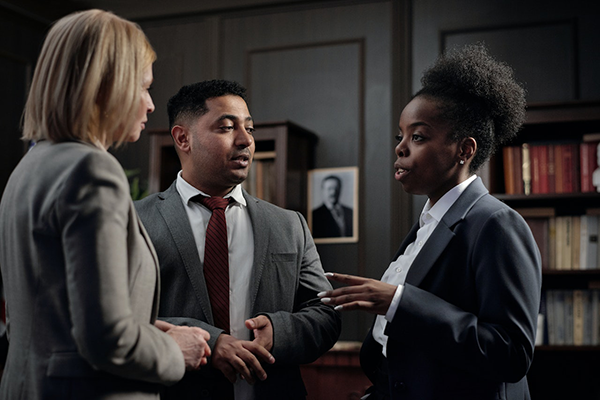In the bustling city of Mississauga, where life moves at a rapid pace, legal disputes can arise unexpectedly, often leaving individuals feeling overwhelmed and uncertain about their rights and the path to justice. This section delves into the pivotal role of a seasoned advocate, well-versed in the complexities of personal harm litigation, who stands as a beacon of support for those navigating through the turbulent waters of legal redress.
Empowerment through expertise is the cornerstone of effective representation. A dedicated practitioner, with a robust understanding of the local legal landscape, is equipped to guide clients through the intricate web of personal injury law. This professional serves as a fierce defender, ensuring that those who have suffered undue harm receive the attention and compensation they rightly deserve.
The journey toward vindicating one’s legal entitlements is fraught with challenges, but with the right ally, the process can be significantly demystified. An adept legal representative, based in the heart of Mississauga, possesses the acumen to dissect cases with precision, crafting a narrative that resonates with the legal system and bolsters the client’s position in the eyes of the law.
This article is a testament to the significance of aligning with an accomplished legal ally–one who is not only intimately familiar with the jurisdiction but also attuned to the emotional and practical needs of their clientele. We explore the attributes that define a proficient counselor in the domain of personal harm cases, highlighting the qualities that set apart a true champion for your legal rights in Mississauga.
If you’re seeking legal assistance after an accident, our personal injury lawyer in Mississauga is ready to fight for your rights and fair compensation.
Grasping the Essence of Legal Compensation: Fundamental Premises and Guidelines
Navigating the complex landscape of compensation law necessitates a deep comprehension of its pivotal notions and axioms. This section elucidates the overarching principles governing recompense claims, providing a foundation for comprehending the measures one can undertake to protect their entitlements in the face of adversity. As we embark on this exploration, we shall dissect the pivotal tenets of this legal domain without delving into specific terminologies, ensuring a comprehensive yet digestible understanding for the reader.
The Basis for Legal Redress
Before delving into the intricacies of the legal framework, it is essential to grasp the rationale behind seeking reparation in court. Essentially, recompense is sought when an individual has suffered detriment due to another party’s misconduct or negligence. This harm can manifest in various forms, including physical, emotional, or financial distress. The central premise is that the aggrieved individual should not bear the burden of another’s missteps, and thus, is entitled to seek restitution for their losses. Understanding this fundamental principle is crucial for appreciating the subsequent concepts and guidelines that underpin recompense law.
Fault and Liability: Identifying the Responsible Party
Ascertaining fault and liability is a critical aspect of recompense litigation. This process involves identifying the party whose actions (or inactions) contributed to the harm sustained by the claimant. Key considerations in this determination include:
- Establishing a duty of care owed by the defendant to the claimant
- Demonstrating a breach of this duty through the defendant’s actions (or inactions)
- Proving that this breach directly caused the harm suffered by the claimant
Types of Harm and Losses: The Spectrum of Recompense Claims
Recompense claims can encompass a wide array of harms and losses, each with its own nuances and implications for the litigation process. Some common categories of harm include:
- Physical injuries, such as fractures, disfigurement, or chronic ailments
- Psychological trauma, including post-traumatic stress disorder or anxiety
- Financial losses, arising from medical expenses, lost wages, or diminished earning capacity
- Non-pecuniary damages, encompassing pain and suffering, loss of enjoyment of life, and diminished quality of life
Proof and Evidence: Building a Compelling Case
Success in recompense litigation hinges on the claimant’s ability to present a compelling case, substantiated by robust evidence. Key elements to consider when building a case include:
- Documenting injuries and medical treatments through medical records and expert testimony
- Establishing a timeline of events and the causal relationship between the defendant’s actions and the claimant’s harm
- Identifying and interviewing witnesses to corroborate the claimant’s account of events
- Consulting with legal professionals to ensure adherence to procedural rules and evidentiary standards
Compensation: Valuing the Claim and Pursuing Adequate Redress
Lastly, it is essential to accurately assess the value of the claim and pursue adequate redress for the claimant’s losses. This process involves considering various factors, such as the severity of the harm, the claimant’s age and occupation, and the impact of the injuries on their quality of life. Engaging legal professionals with a deep understanding of recompense law is crucial for navigating this complex valuation process and securing a fair outcome for the claimant.
The Significance of Carelessness in Legal Disputes Involving Bodily Harm
In the intricate world of legal proceedings pertaining to personal injuries, the concept of negligence assumes paramount importance. It serves as the linchpin around which the entire case revolves, determining the legal responsibility and the potential claim for compensation. Negligence, in this context, refers to the failure to exercise a reasonable degree of care, resulting in harm to another individual. This section delves into the critical role of negligence in these cases, shedding light on its various aspects and implications.
Understanding Negligence in Legal Contexts
Negligence forms the bedrock of personal injury litigation, as it establishes the link between the defendant’s conduct and the plaintiff’s injuries. To prove negligence, a plaintiff must demonstrate the following elements:
- The existence of a duty of care owed by the defendant to the plaintiff.
- A breach of that duty through the defendant’s actions or inactions.
- A causal connection between the breach and the plaintiff’s injuries.
- Actual damages or harm sustained by the plaintiff as a result.
The Legal Consequences of Negligence
Recognizing and proving negligence is essential for several reasons:
- Claims Certification: Negligence validation is a prerequisite for a personal injury claim to be considered valid under the law.
- Compensation Eligibility: It determines the potential for financial recompense for the plaintiff’s injuries, including medical expenses, lost wages, and pain and suffering.
- Legal Accountability: Establishing negligence assigns responsibility to the party whose lack of care led to the harm, promoting accountability within society.
- Preventive Measures: It serves as a deterrent, encouraging individuals and entities to take necessary precautions to avoid causing harm to others.
Strategies for Proving Negligence
To successfully argue a negligence case, one must employ a combination of legal strategies and evidentiary support:
- Gathering comprehensive evidence, including witness testimonies, medical records, and expert opinions.
- Demonstrating a clear sequence of events that led from the negligence to the injury.
- Showing that the defendant’s actions fell below the standard of care expected in similar circumstances.
- Providing a detailed account of the damages incurred and their impact on the plaintiff’s life.
The Role of Legal Counsel in Negligence Cases
Navigating the complexities of negligence in personal injury cases can be a daunting task. Hence, the guidance of seasoned legal advisors becomes indispensable:
- They possess the expertise to identify and articulate the nuances of negligence.
- They can build a robust case backed by compelling evidence and legal precedents.
- They advocate for fair compensation, ensuring that the plaintiff’s rights and interests are fully protected.
In conclusion, negligence is a critical factor in personal injury cases, dictating the course of legal action and the outcome for the parties involved. Recognizing its significance is the first step towards asserting one’s rights and seeking justice in the face of harm caused by another’s lack of care.
Varieties of Financial Reparations Claimants Might Seek in Mississauga
When navigating the complexities of legal proceedings aimed at rectifying a physical or psychological detriment, individuals in Mississauga are presented with a spectrum of remedies designed to address the multifaceted impacts of their suffering. These compensatory avenues serve not only to redress the immediate fiscal aftermath of an incident but also to provide a means of recuperation for the intangible tolls exacted upon one’s quality of life. In the pursuit of recompense, claimants can explore several categories of redress that are tailored to correspond with the distinctive dimensions of their individual cases.
Economic Losses: Among the primary considerations in the computation of appropriate recompense are the concrete financial setbacks incurred as a direct consequence of the injury. These may encompass immediate medical expenses, including those for emergency care, surgery, or rehabilitative therapies, as well as projected future healthcare costs. Additionally, claimants should account for any loss of income resulting from their inability to work, both in the present and in the anticipated future, which could extend to a diminished earning capacity if the injury causes a permanent alteration to their employment prospects.
Non-Economic Losses: Beyond the strictly pecuniary ramifications, there exist intangible harms that warrant consideration in the quest for equitable compensation. Such non-economic damages may encapsulate the physical pain and emotional anguish endured, the erosion of one’s enjoyment of life, and the diminution of their overall well-being. In some instances, the dislocation or loss of familial and social relationships, as well as the strain on marital dynamics, can be factored into the assessment of non-economic reparations.
Punitive Damages: In cases where the conduct of the responsible party is deemed particularly egregious or reprehensible, claimants might also solicit punitive damages. These are intended not as a form of restitution but rather as a deterrent against such malevolent behavior in the future and to set an example by imposing a sanction beyond the scope of compensatory redress.
As claimants in Mississauga embark on the journey to obtain the compensation they merit, understanding the array of damages they can legally pursue is paramount. Engaging with a proficient legal advocate can prove invaluable in navigating this intricate landscape, ensuring that the multifarious aspects of their loss are thoroughly addressed and justly compensated.
Choosing the Ideal Legal Ally: Attributes to Seek in an Accident Compensation Advocate
In the complex landscape of legal representation, securing the services of a proficient accident compensation advocate is paramount for those seeking justice and fair recompense following an injury. This section delves into the essential characteristics that distinguish a competent legal professional from the rest, ensuring that your quest for redress is in capable hands. Not all legal practitioners are crafted equal; hence, discerning individuals must acquaint themselves with the traits that signify a reliable partner in navigating the legal maze.
Firstly, the adeptness of an accident compensation advocate is measured not just by their acumen in legal intricacies but also by their aptitude for empathetic understanding. A compassionate counselor who can resonate with your plight is indispensable. They should possess the finesse to translate your narrative into a compelling argument, leveraging their legal prowess to advocate on your behalf effectively.
Moreover, a steadfast commitment to client advocacy is non-negotiable. The ideal legal partner will be unwavering in their dedication to your cause, exhibiting a tireless work ethic that reflects in thorough case preparation and dynamic representation. Their unyielding determination is the bulwark against opposing forces, ensuring that your rights are upheld with vigor and diligence.
Experience in the courtroom and out-of-court negotiations is another cornerstone of a proficient accident compensation advocate. A seasoned professional brings to the table a wealth of knowledge derived from past engagements, enabling them to anticipate challenges and devise strategic solutions. Their track record serves as a beacon of assurance, signifying their ability to navigate the labyrinth of personal injury law.
Furthermore, clear and consistent communication is a hallmark of a trustworthy legal ally. An advocate who maintains open lines of dialogue, keeping you informed at every juncture, fosters a partnership grounded in transparency and trust. Their responsiveness to your queries and concerns is a testament to their professionalism and respect for your role in the legal process.
In summary, when selecting an accident compensation advocate, look for traits that encompass empathy, unwavering commitment, seasoned experience, and effective communication. By identifying these qualities in your legal partner, you set the stage for a robust defense of your entitlements, confident that your pursuit of justice is guided by a consummate professional.
Remember, the choice of legal representation is a pivotal decision that can significantly influence the outcome of your case. Opt for an advocate who not only abides by the highest standards of the legal profession but also resonates with your personal journey, offering a steady hand in the pursuit of equitable reparation.
Expertise and Focus on Personal Harm Legal Matters in Mississauga
In the realm of legal advocacy, the city of Mississauga boasts a distinguished cadre of professionals dedicated to the intricate field of personal harm law. These seasoned experts, with their astute comprehension of the local judicial landscape, offer a robust shield for those navigating the complex aftermath of bodily trauma. Their commitment is unwavering, as they stand as the vanguard for individuals seeking justice and recompense in the face of adversity, providing a beacon of hope and a pathway to equitable outcomes.
Local Expertise: A Decisive Edge in the Courtroom
The mastery of personal harm legal proceedings is not merely theoretical but also deeply rooted in the practicalities of the Mississauga legal sphere. These advocates possess an intimate understanding of the local statutes and precedents, which they skillfully weave into their strategic tapestry. Their familiarity with the nuances of the local judicial system allows them to anticipate challenges and devise effective countermeasures, ensuring that their clients’ narratives are eloquently conveyed and persuasively argued.
Tailored Advocacy: Crafting Individualized Solutions
Recognizing that each case of personal harm is unique, these legal specialists eschew a one-size-fits-all approach. Instead, they embark on a meticulous journey of case analysis, uncovering the distinctive facets of each situation. By customizing their legal strategies to align with the specific circumstances of their clients, they foster an environment conducive to successful resolution. This personalized methodology ensures that every individual’s rights are not only preserved but also championed with vigor and conviction.
Empathetic Counsel: Beyond Legal Counsel
Beyond their legal acumen, these practitioners in Mississauga extend a compassionate hand to their clientele. They understand the emotional turmoil that often accompanies personal harm incidents and are committed to offering not just legal counsel but also a supportive presence. This empathetic approach fosters a strong attorney-client relationship, built on trust and mutual respect, which is pivotal in navigating the complexities of personal harm litigation.
In summation, the expertise and specialization in personal harm legal matters in Mississauga stand as a testament to the dedication and proficiency of its legal professionals. They are the pillars upon which clients can lean, trusting in their seasoned guidance to traverse the often-treacherous terrain of personal harm law, and emerge with their dignity and rights intact.
Efficiency and Outcome Analysis of Prospective Legal Representatives
When navigating the complex landscape of legal representation, one of the most pivotal factors to consider is the track record of prospective advocates. This section delves into the significance of evaluating the performance metrics and adjudicated outcomes associated with potential legal practitioners, particularly those specializing in personal harm litigation within the legal services market. It is crucial to assess the efficacy of these professionals in securing favorable resolutions for their clients, as this directly correlates to the potential success in your own legal journey. By examining the historical data pertaining to their litigation victories and settlements, you can make an informed decision about the suitability of a legal counsel to champion your case in the courtroom or at the negotiation table.
In the realm of legal battles concerning bodily harm, the prowess and strategic acumen of your chosen representative can make a discernible difference in the final verdict or settlement amount. It is essential to scrutinize the annals of a potential advocate’s career, focusing on instances where they have successfully secured justice for plaintiffs in situations analogous to yours. This examination should encompass an analysis of the proportion of cases that have culminated in a favorable outcome, as well as the magnitude of the compensatory awards garnered for their clients. Additionally, it is prudent to inquire about any notable cases where the legal representative’s efforts have set a precedent or have been publicly recognized for their excellence.
Furthermore, the dynamics of a legal representative’s approach to negotiation and litigation are paramount to consider. An adept advocate will not only possess a commendable success rate but will also demonstrate a finesse in striking a balance between assertiveness and amicability. This is particularly salient in matters of personal injury, where the resolution often hinges on the ability to convey the extent of the harm inflicted and the corresponding need for fair reparation. Therefore, the prospective attorney’s case results should reflect a consistent pattern of achieving equitable settlements without unnecessary escalation to protracted courtroom proceedings, unless such escalation is strategically advantageous.
In summary, when seeking a legal practitioner to assist with claims arising from personal harm, it is imperative to conduct a thorough assessment of their professional history. This includes an evaluation of their success rate, notable case outcomes, and the nuanced tactics they employ to secure the best possible outcome for their clients. By doing so, you can confidently select an attorney who is not only capable but also adept at fighting for the compensation and justice you deserve.
Amplifying Your Reparation: Tactics for a Triumph in Personal Injury Litigation
Embarking on the journey to secure a just remuneration for one’s tribulations, following a physical harm incident, demands astute strategies to ensure one emerges with a fair recompense. This segment delves into the nuanced approaches that can be employed to augment the financial redress, thereby ensuring a favorable outcome in the pursuit of justice for personal injury.
Preparation: The Foundation of a Robust Case
The cornerstone of any successful legal endeavor lies in meticulous preparation. This entails thorough documentation of the incident, maintaining a detailed record of medical treatments and expenses, and the establishment of a timeline of events surrounding the injury. Equipping oneself with this comprehensive dossier is akin to arming a champion with the finest armor before a battle. It serves to fortify the claim and provides a solid narrative that can withstand the scrutiny of the legal arena.
Documentation: Records of the injury, medical reports, and all correspondence with insurance entities and healthcare providers should be compiled and organized. This archive not only substantiates the extent of the injury and its resulting impacts but also underscores the diligence of the claimant in seeking redress.
Evidence Gathering: Beyond the clinical documentation, other forms of evidence, such as witness testimonies, photographs of the accident scene, and surveillance footage, can significantly bolster the case. These supplementary proofs are instrumental in painting a vivid picture of the incident, thereby strengthening the claim’s credibility.
Strategic Negotiation: The Art of Advocacy
In the legal arena, effective negotiation is an art form that can lead to a more favorable settlement. Engaging in dialogue with the opposing party requires a delicate balance of assertiveness and diplomacy. Understanding the value of one’s claim and being willing to advocate for it is crucial. This involves not only presenting the facts of the case but also empathizing with the emotional and psychological toll the injury has taken on the claimant’s life.
Assertiveness: Standing firm on the perceived value of the case is essential. This does not mean being unyielding but rather being resolute in the pursuit of a fair compensation that reflects the totality of the damages incurred.
Negotiation: A skilled negotiator understands that the initial offer is often a starting point. Through measured counteroffers and highlighting the strengths of the case, it is possible to steer the negotiation towards a more advantageous settlement.
Legal Representation: The Shield and Sword in the Battle
Engaging a seasoned advocate who specializes in personal injury claims is akin to enlisting a seasoned general to lead a war campaign. Their expertise in navigating the complexities of the legal system, understanding the nuances of claim valuation, and their prowess in legal combat can be the decisive factor in securing a beneficial outcome.
Specialization: A lawyer who is well-versed in personal injury law will bring a wealth of knowledge and experience to the case, which can be instrumental in identifying the various avenues for compensation that a layperson may overlook.
Litigation Strategy: A strategic legal mind can craft a compelling narrative and identify key points that can tip the scales of justice in the claimant’s favor. They can also prepare for the possibility of trial, where a well-argued case can lead to a jury awarding a substantial compensation.
In the grand scheme of personal injury litigation, these strategies form the bedrock of a victorious campaign. By embracing preparation, negotiation, and robust legal representation, claimants can navigate the often daunting legal landscape with confidence, ultimately maximizing their chances of securing a just and equitable recompense for their suffering.
4. “Question-Answer”
What types of injuries does an experienced injury attorney in Mississauga typically handle?
An experienced injury attorney in Mississauga typically handles a wide range of injury cases, including motor vehicle accidents, slip and fall incidents, medical malpractice, wrongful death, product liability, and more. They specialize in helping victims receive the compensation they deserve for their injuries, lost wages, medical expenses, and pain and suffering.
How do I know if I need an experienced injury attorney in Mississauga?
You may need an experienced injury attorney in Mississauga if you’ve been injured in an accident due to someone else’s negligence, or if you’re facing legal challenges in obtaining compensation for your injuries. A knowledgeable attorney can help you navigate the complexities of personal injury law, ensure your rights are protected, and fight for the maximum compensation you’re entitled to.
What should I look for when choosing an experienced injury attorney in Mississauga?
When choosing an experienced injury attorney in Mississauga, consider factors such as their expertise in personal injury law, years of experience, proven track record of success, and strong communication skills. It’s also important to find an attorney who makes you feel comfortable and confident in their ability to handle your case effectively.
How much does it cost to hire an experienced injury attorney in Mississauga?
Many experienced injury attorneys in Mississauga work on a contingency fee basis, which means you won’t have to pay any upfront fees. Instead, they take a percentage of the compensation you receive as their payment. However, it’s essential to discuss the fee structure with your attorney during your initial consultation to ensure you’re both on the same page.
How long does it typically take for an experienced injury attorney in Mississauga to resolve a case?
The time it takes to resolve a case with the help of an experienced injury attorney in Mississauga can vary depending on the complexity of the case, the willingness of the parties to negotiate, and other factors. Some cases may be resolved in a matter of months, while others could take a year or more. Your attorney will provide guidance on the expected timeline based on the specifics of your case.

Laura Chen is a dedicated Personal Injury Lawyer with a specific focus on Motor Vehicle Accidents and Workplace Injuries. An alumna of McGill University, where she received her LL.M., Laura has become a respected figure in the Canadian legal sector over her fifteen-year career. She has a proven record of aggressively advocating for her clients’ rights, often achieving significant financial settlements in challenging injury cases. Laura’s detailed understanding of accident and labor laws, coupled with her strategic acumen, has resulted in a high success rate in both settlements and court verdicts. Laura’s passion for law is matched by her commitment to her clients, as she works tirelessly to ensure they receive the justice they deserve.


